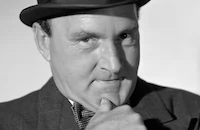After the Fox

Brief Synopsis
Cast & Crew
Vittorio De Sica
Peter Sellers
Victor Mature
Britt Ekland
Martin Balsam
Akim Tamiroff
Film Details
Technical Specs

Synopsis
Relaxing in jail for the ninth time in 11 years, Aldo Vanucci, alias "The Fox," remains unmoved by a discussion among fellow inmates Pollo, Carlo, and Siepi about a recent gold bullion robbery in Cairo valued at $3 million. However, when he hears rumors that his younger sister Gina has become a girl of the streets, he switches places with the prison doctor who has come to examine him and once again returns to society. Racing to Rome, he catches Gina trying to pick up a fat, middle-aged man on the street. Enraged, Aldo attacks the man, only to discover that his sister is making a cinéma vérité film. The incident provides Aldo with an inspirational idea for helping archcriminal Okra smuggle the stolen gold bullion into Italy. Posing as "new wave" director Federico Fabrizi, Aldo hijacks some motion picture equipment, hires a fading American matinee idol, Tony Powell, as his star, and sets up for location filming at a small Mediterranean fishing village where the bullion is to be brought in by ship from Cairo. He plans to incorporate the landing of the gold into the plot of his film and obtains the assistance of the local police chief. Everything runs smoothly until Tony's manager, Harry Granoff, tips off the police, and Okra pulls a last-minute double-cross which lands everybody in jail after a long chase involving the police and Interpol. To save Gina, Tony, and the innocent villagers, Aldo confesses, but not before hearing his film acclaimed as "the work of a primitive genius." Aldo is again sent back to prison with a 5-year sentence; but, since he has made a date for the following April, he undertakes to escape again.

Director

Vittorio De Sica
Cast

Peter Sellers

Victor Mature

Britt Ekland

Martin Balsam

Akim Tamiroff
Paolo Stoppa
Tino Buazzelli
Mac Ronay
Lydia Brazzi
Lando Buzzanca
Maria Grazia Buccella

Maurice Denham
Tiberio Murgia
Francesco De Leone
Carlo Croccolo
Nino Musco
Pier Luigi Pizzi
Lino Mattera
Piero Gerlini
Daniele Vargas
Franco Sportelli
Giustino Durano
Mimmo Poli
Enzo Fiermonte
Roberto De Simone
Angelo Spaggiari
David Lodge
Timothy Bateson

Vittorio De Sica
Crew
Burt Bacharach
Burt Bacharach
Leonida Barboni
Maurice Binder
Charles Blackwell
Gabriella Borzelli
John Bryan
Franco Cirino
Hal David
Sash Fisher
Stuart Freeborn
Amato Garbini
Mario Garbuglia
Russell Lloyd
Maurizio Lodi-fe
Neil Simon
Neil Simon
Giorgio Stegani
Richard Talmadge
Orazio Tassara
Piero Tosi
Cesare Zavattini

Photo Collections
Videos
Trailer
Promo
Film Details
Technical Specs

Articles
After the Fox
An incompetent thief, "the Fox" breaks out of jail to arrange for the transfer of $3 million in gold from Cairo to Rome. Hiding in various disguises (prison doctor, Italian policeman, New Wave film director, to name a few), Fox cooks up a plan to "film" a movie in which the gold is transferred in a "scene." He crosses paths with an aging star played by none other than Victor Mature, who came out of retirement to poke fun at his own screen persona.
In an odd twist of casting, Britt Ekland, the Swedish model and ingenue, plays Fox's sister, donning a brunette wig to play an Italian. Sellers was responsible for the hiring of Ekland, who was then the second Mrs. Sellers. The final swingin' '60s touch is provided by Burt Bacharach's irresistible score featuring a duet between the Hollies and Peter Sellers on the theme song.
Unfortunately, during the filming Sellers was neurotic and unpredictable. Days after production began, he tried to have De Sica removed from the picture and argued constantly with Ekland. One evening, he even threw a chair at Ekland, who took temporary refuge in the rented home of Neil Simon, who was responsible for the screenplay of After the Fox.
Simon later recalled his screenwriting debut as an experience reminiscent of a Marx Brothers comedy and has acknowledged that the film retains a "cult" following. As Simon notes in his autobiography, De Sica always began shooting late in the day and had a penchant for phoning the local casino to place bets. He and his Italian crew also entertained a host of superstitions on the set -- at one point, when a frustrated Mature threw his script into the ocean, a priest was summoned to bless the soggy sheets.
After the Fox takes its place among the unofficial genre of wacky '60s comedies (such as Candy, 1968; The Magic Christian, 1969; Skidoo, 1968) that feature an unlikely combination of director, actors and offbeat storyline. The results make for a unique, if bizarre, testament to the melting pot that was '60s culture.
Producer: John Bryan, Maurizio Lodi-Fe
Director: Vittorio De Sica
Screenplay: Neil Simon, Cesare Zavattini
Cinematography: Leonida Barboni
Editing: Russell Lloyd
Music: Burt Bacharach
Cast: Peter Sellers (Aldo Vanucci/Federico Fabrizi), Victor Mature (Tony Powell), Britt Ekland (Gina Romantica), Martin Balsam (Harry), Akim Tamiroff (Okra), Paolo Stoppa (Polio), Tino Buazzelli (Siepi), Maurice Denham (Chief of Interpol).
C-104m. Letterboxed.
by Genevieve McGillicuddy

After the Fox
Quotes
Trivia
Musicians in the band on the soundtrack included bassist Jack Bruce and Burt Bacharach on piano.
Notes
Filmed in Italy. Released in Great Britain and Italy in 1966. Italian title: Caccia alla volpe.

Miscellaneous Notes
Released in United States Winter December 15, 1966
Released in United States Winter December 15, 1966















